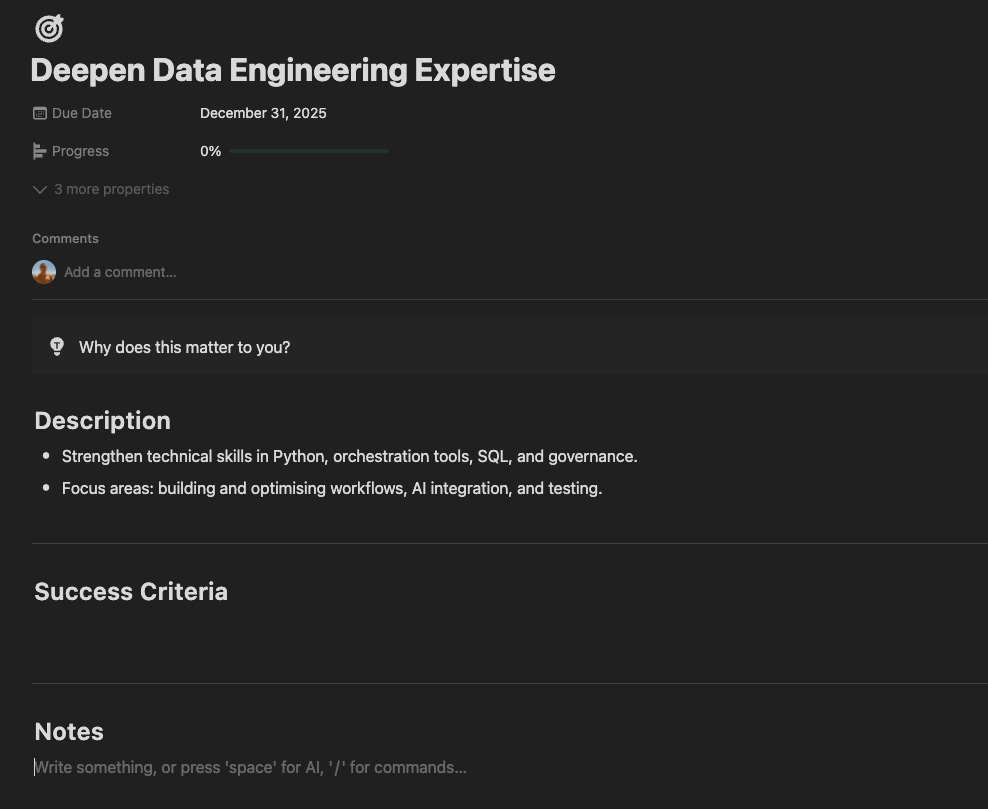Level-Up Data Engineering: Block Time, Learn Faster, Achieve More
How to create a learning plan for technical and soft skills to achieve your 2025 goals
You are reading Level-Up Data Engineering — a special monthly minicourse series designed to turn mid-level data engineers into senior. Subscribe for a paid plan to boost your career growth by turning skills into habits.
Greetings, curious reader,
Have you ever felt excited about your learning goals in January but lost steam by March?
You and I both know it’s not because you are lazy. It’s because of the lack of a proper system.
When broken down, a great plan feels manageable and keeps you going even when life gets busy.
In this article, I will show you how to build a personalised roadmap to level up in data engineering or any other focus area in 2025.
By setting aside just one hour per week, you can create habits, build momentum, and measure your progress effectively.
The best part? This system works not just for January but every month of the year.
And don’t forget what I promised last time. I created a big template with goals, milestones, tasks, and more. It contains everything you need for the 2025 Data Engineering Level-Up series, and you can use it for all your planning.
Subscribe to Data Gibberish and steal one of my best productivity tools ever.
📉 The Challenge of Consistent Learning
Learning new skills is exciting, but sticking to a plan is hard. Things come up. Your time is limited. You get distracted.
Here are the three most common blockers:
Competing Priorities: Work deadlines and life responsibilities always feel more urgent.
No Structure: Without a plan, learning feels unorganised and directionless.
Limited Time: A packed schedule leaves little room for structured skill development.
Without a system, you might waste time on low-impact activities. Minor frustrations pile up. Eventually, you feel stuck and stop learning.
🏗️ Week #1: Building a Foundation
Start the year by defining your focus areas. Setting goals early gives your plan structure and keeps you motivated.
🎯 Step #1: Identify Your Core Goals
Choose up to three key skills to focus on this year. A mix of technical and soft skills works well. For example:
Technical Skill: Mastering cloud infrastructure or advanced data pipelines.
Soft Skill: Learning better stakeholder communication or negotiation.
Write these goals down in Notion, Excel, or Google Sheets. Next to each goal, write why it matters to you. Be honest. Your “why” should connect to your career growth or personal aspirations.
Pro Tip: Don’t go overboard with goals. Stick to 1-3 areas to go deep instead of wide.

🌟 Why This Matters
Defining your goals sets the direction for your learning efforts. Without clarity, you may end up working on skills that don’t align with your broader objectives.
Knowing the “why" keeps you focused and avoids distractions from less relevant skills.
Clarity also helps you measure progress. That way, you know if you will get closer to your end goal.
⏱️ Step #2: Time-Blocking Basics
Time-blocking ensures consistent progress. Reserve one to two hours weekly for uninterrupted learning sessions.
Open your calendar tool, like Google Calendar, Vimcal or Notion Calendar and block recurring events titled "Learning: [Skill Name]."
These sessions should be non-negotiable!
Additionally, schedule time at the end of the week to reflect on your progress and make any necessary adjustments.
Pro Tip: You can do this with every detail of your life. If a task is not on the calendar, I won't do it.
🌟 Why This Matters
Time-blocking creates accountability.
Learning time becomes a priority rather than an afterthought when it is part of your calendar. Treating it as a scheduled meeting ensures consistency, even during busy weeks.
Moreover, this practice minimises decision fatigue. Planning your time upfront frees mental energy for the actual work.
🚧 Week #2: Breaking Down Goals into Milestones
Once you’ve defined your goals, it’s time to break them into actionable monthly milestones. This ensures your progress is measurable and keeps you motivated.
✂️ Step #1: Create Monthly Milestones
Divide each goal into smaller, manageable steps.
Here’s an example:
Month 1: Complete three tutorials on distributed systems.
Month 2: Deliver a short presentation to a small audience.
Month 3: Build a sandbox project.
Month 4: Implement feedback to refine your style.
Document these milestones in your Notion page or spreadsheet.
Assign each milestone a deadline and a success metric like "Complete two presentations by the end of Month 2."
Be careful! Life can get in your way. Do not fill the year with ambitious milestones.
Leave some leeway. You need time to go on vacation or finish things you couldn't.
ProTip: Try to switch between goals each month. This will make your experience more enjoyable.
🌟 Why This Matters
Breaking goals into smaller milestones helps you avoid overwhelm and maintain momentum.
Monthly targets provide a clear sense of progress, which is critical for motivation. For instance, completing a sandbox project in Month 3 gives you a tangible achievement to build upon in the next phase.
This approach highlights dependencies and ensures you have solid foundational skills before advancing.






